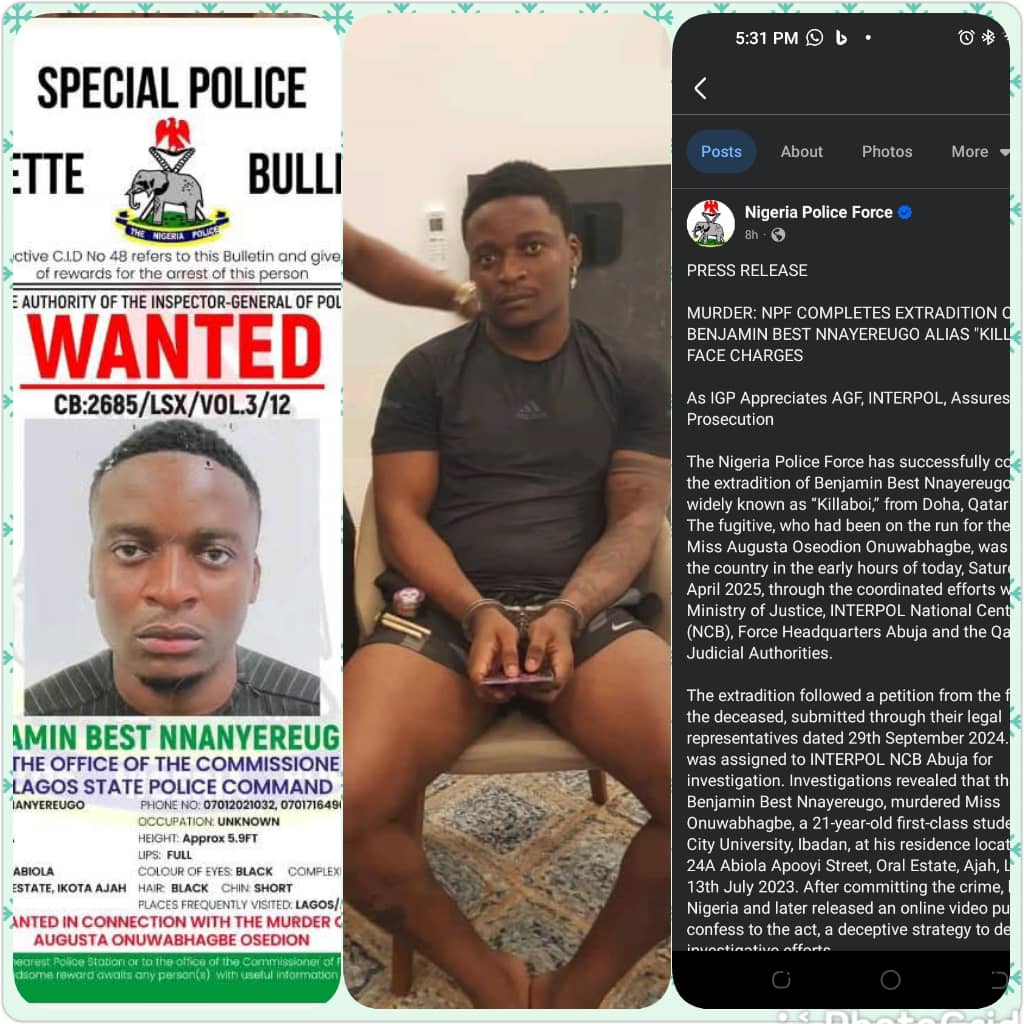By Mazi Obinna Victor Uzoaganaobi
USB-Information Telecommunications and Postal Services
The Nigeria Police Force recently celebrated a high-profile achievement: the extradition of Benjamin Best Nnayereugo, alias “Killaboi,” from Doha, Qatar, to Nigeria on April 19, 2025. This murder suspect, accused of killing 21-year-old Augusta Oseodion Onuwabhagbe in Lagos on July 13, 2023, had fled across multiple countries, evading capture under false identities. Through what the police described as “robust international cooperation” and “advanced biometrics,” they tracked him from West Africa to East Asia, the Middle East, and finally to Qatar, where he was arrested and repatriated.

This feat, executed in collaboration with INTERPOL, the Ministry of Justice, and Qatari authorities, showcases the Nigeria Police Force’s capacity for sophisticated, cross-border investigations. Yet, this success story raises a troubling question: if The Inspector-General of Police, IGP Kayode Adeolu Egbetokun can trace and apprehend a fugitive across continents, why have they consistently failed to arrest Fulani herdsmen terrorists who openly perpetrate massacres within Nigeria’s borders?
The Fulani herdsmen, widely implicated in terrorist activities across Nigeria, have left a trail of bloodshed, displacing communities and destroying livelihoods in States like Plateau, Benue, Eha-Amufu Enugu
These terrorists operate with brazen impunity, often filming their exploits and flaunting bundles of cash extorted through kidnappings and other criminal activities. Their videos circulate freely on the internet, their faces unmasked, their locations often within Nigeria’s geographical confines. Despite this, the Nigeria Police Force has not applied the same “advanced biometrics” or “robust” investigative techniques to apprehend them. The contrast is stark: a murder suspect using forged identities and traversing multiple countries is swiftly tracked, while Fulani terrorists, operating openly within Nigeria, remain untouchable. This discrepancy is not merely a failure of competence, it points to a deeper, more sinister culpability.
The extradition of Killaboi reveals the Nigeria Police Force’s capabilities. After escaping a prison break in Freetown, Sierra Leone, under the alias “Kanu Princeton Samuel,” the suspect moved through West Africa, East Asia, and the Middle East before settling in Qatar as “Toure Abdoulaye” with a fraudulent Guinean passport. The police, leveraging INTERPOL’s global network and biometric technology, meticulously traced his movements and secured his arrest and extradition. This operation required coordination across multiple jurisdictions, intelligence gathering, and technological sophistication. Yet, when it comes to Fulani herdsmen, whose hideouts are often known and whose activities are well-documented, the police claim helplessness. No camps are raided, no arrests are made, and no prosecutions follow. Instead, these terrorists continue their reign of terror, undeterred by the same security apparatus that can track a fugitive to Doha.
This selective efficiency raises uncomfortable questions about the Nigeria Police Force’s role in Nigeria’s insecurity. The police frequently boast of dismantling alleged camps of groups like the Indigenous People of Biafra (IPOB) or the Biafra Liberation Army (BLA), often with fanfare and media coverage. Yet, Fulani terrorist hideouts remain untouched. The BLA, whose duties are solely to protect Biafraland from Fulani incursions, faces relentless pursuit by security forces, especially the Nigeria Police Force and HQ Nigerian Army while the real perpetrators of mass religious/genocidal attacks operate without fear of reprisal. This double standard points to the fact that the Nigeria Police Force, and by extension other security agencies, are undoubtedly complicit in shielding Fulani terrorists, either through active sponsorship or deliberate inaction.
The implications are chilling. If the police possess the tools to track a fugitive across continents but refuse to apply them to domestic terrorists, it is reasonable to conclude that they are enabling the violence. The Fulani herdsmen, alongside groups like Boko Haram, have ravaged Nigeria for years, killing thousands and displacing millions. Their attacks are not random; they are systematic, targeting vulnerable communities with precision. The failure to curb this terrorist attacks, despite the police’s demonstrated capabilities, points to a systemic issue rooted in political and ethnic dynamics. The Nigeria Police Force, and indeed the Nigerian state, appears unwilling to confront the Fulani terrorists, possibly due to their ties to powerful interests or a fear of destabilizing fragile ethno-political alliances.
This brings us to a sobering reality: the terrorist activities of Boko Haram and Fulani herdsmen will not cease until Nigeria itself unravels. The Nigerian state, as it exists, is structurally incapable of addressing this crisis. The police and military, compromised by internal biases and external pressures, lack the will to act decisively against Fulani terrorists. Insecurity in Nigeria is not a problem awaiting a solution rather it is a feature of a fractured nation. The belief that the federal government of Nigeria under President Asiwaju Bola Ahmed Tinubu , police or military will suddenly rise to the occasion is a dangerous delusion. Those who wait for salvation from these institutions risk becoming victims of the very system that enables the violence.
The culpability of the Nigeria Police Force and all the security agencies in the Boko Haram and Fulani herdsmen terrorist attacks is not a conspiracy theory, it is a conclusion drawn from their own actions and inactions. Their ability to extradite a murder suspect from Qatar while ignoring terrorists within Nigeria’s borders speaks volumes. The Fulani herdsmen, emboldened by this impunity, will continue their campaign of terror, and groups like Boko Haram will thrive in the resulting chaos. Nigeria’s out-and-out DISINTEGRATION, whether through formal dissolution or a descent into ungovernable anarchy, appears inevitable unless the root causes of this complicity are addressed. Until then, the blood of innocent Nigerians will continue to stain the hands of those tasked with their protection.






